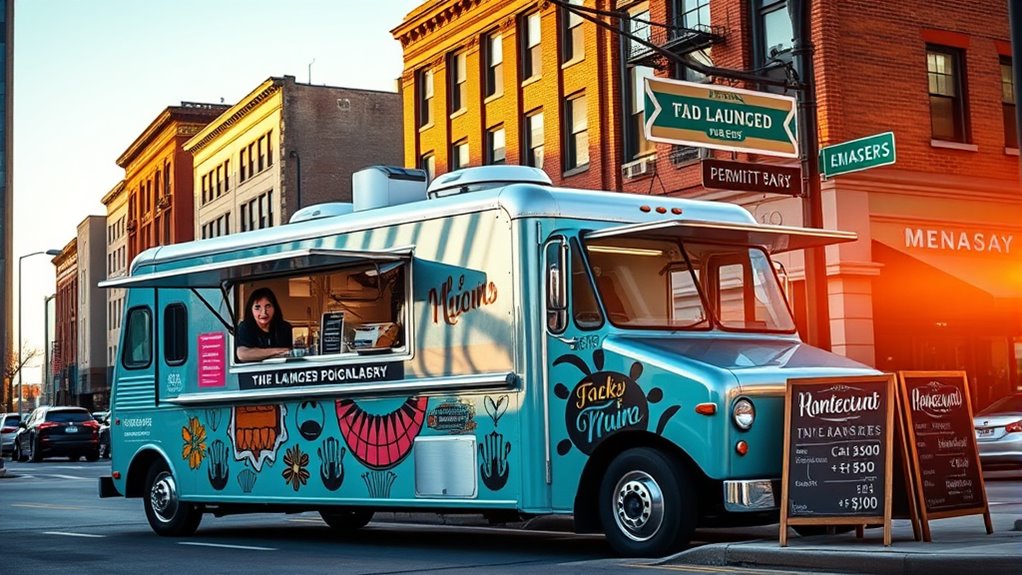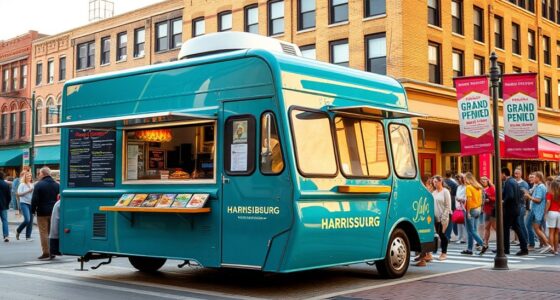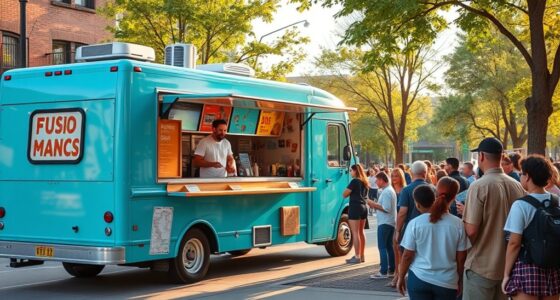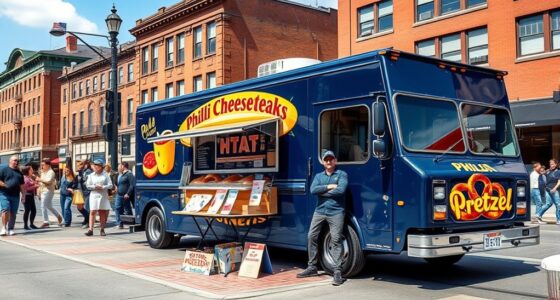Starting a food truck in Omaha involves obtaining permits from the Nebraska Department of Agriculture and local health departments, with costs ranging from $1,800 to over $28,000. You’ll need strategic spots like the Old Market or Midtown Crossing, and crafting a menu featuring regional favorites and diverse options can attract customers. Effective marketing includes social media and event participation. If you keep exploring, you’ll discover more detailed steps to launch your successful Omaha food truck.
Key Takeaways
- Obtain required permits from Nebraska Department of Agriculture, Omaha health department, and city offices, ensuring compliance with food safety and operational regulations.
- Startup costs range from $52,800 to over $239,000, covering vehicle purchase, outfitting, permits, and initial marketing.
- Prime locations include Old Market, Blackstone, Downtown Omaha, Midtown Crossing, and city-permitted zones with proper sanitation facilities.
- Develop a menu featuring regional favorites, ethnic cuisines, and seasonal specials emphasizing local ingredients and food safety standards.
- Use social media, participate in local events, and establish loyalty programs to boost visibility and customer engagement in Omaha.
Navigating the Permit and Licensing Process in Omaha
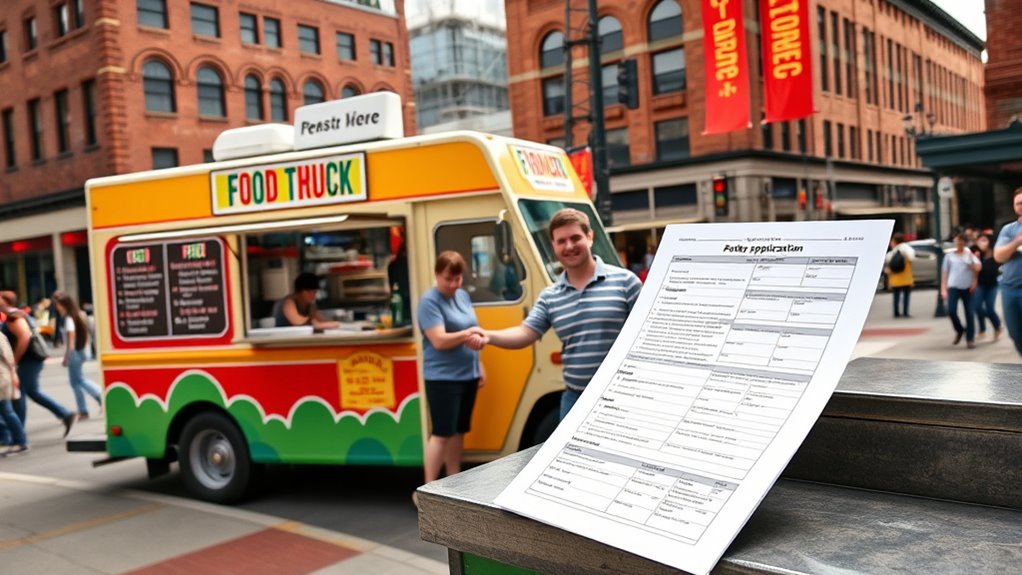
Navigating the permit and licensing process for food trucks in Omaha can seem complex, but understanding the requirements makes it manageable. First, you’ll need to secure several permits, including the Nebraska Department of Agriculture FSCP Permit if you’re not operating at more than two days per year. The Food Establishment Permit from the Lincoln-Lancaster County Health Department covers health standards, while the Mobile Food Preparation Vehicle Operational Permit is specific to your truck. You also need a Food Truck Program Permit from the City Clerk’s Office for vending within city limits. Be prepared to submit documentation like business registration, insurance certificates, health department certifications, vehicle registration, and site plans. An initial inspection ensures your truck meets safety standards. Staying organized and maintaining compliance throughout your operation is key to a smooth process. Additionally, securing the appropriate permits and adhering to local health and safety regulations is essential for legal operation and avoiding penalties. Understanding local regulations can help prevent unexpected delays or violations.
Estimating the Expenses for Your Food Truck Venture
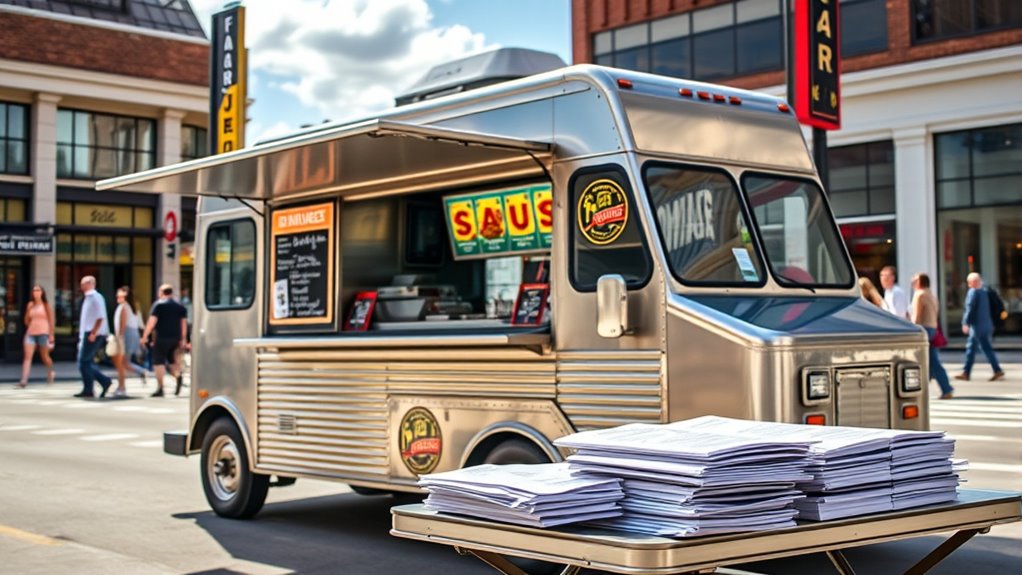
Understanding your startup costs and ongoing expenses is essential for a successful food truck business in Omaha. You’ll need to budget for vehicle costs, permits, licenses, and initial supplies, along with recurring costs like insurance and fuel. Planning for these expenses helps guarantee you’re financially prepared as you launch and grow. Additionally, considering the various startup costs involved, such as truck purchase or rental, initial inventory, and marketing, will help you develop a comprehensive budget to ensure a smooth start. Recognizing the importance of cost-effective planning can further optimize your spending and increase profitability.
Startup Costs Breakdown
Starting a food truck involves various upfront costs that you’ll need to carefully guarantee your venture gets off the ground smoothly. Vehicle purchase prices range from about $30,000 to $150,000, depending on whether you buy new or used and how much you customize. Outfitting the truck with essential kitchen equipment can cost between $20,000 and $60,000, especially if you add specialty appliances. You might opt for leasing or renting, which lowers initial costs but could increase long-term expenses. Branding, including graphics and wraps, typically costs $2,000 to $5,000. Permits and licenses in Omaha can range from $1,800 to over $28,000, covering health permits, zoning, and event fees. Initial inventory, supplies, insurance, safety equipment, and marketing budgets add to your startup expenses, totaling a significant initial investment.
Ongoing Operational Expenses
Managing ongoing expenses is essential to keeping your food truck business profitable. These costs include fuel, maintenance, labor, supplies, permits, and marketing. Fuel costs can range from $300 to $1,000 per month, depending on routes and generator use. Maintenance averages $500 to $1,000 monthly, with annual vehicle upkeep of $500 to $1,200. Labor costs for 2-4 staff members typically fall between $6,000 and $12,000 monthly. Inventory expenses depend on menu complexity, ranging from $1,000 to $5,000 monthly. Commissary fees are $1,000 to $1,500, while parking and event permits add to costs. Marketing efforts like website hosting and social media are ongoing investments to attract customers. Sound therapy techniques can also be incorporated into your business environment to promote relaxation and reduce stress for both staff and customers.
Identifying Prime Locations and Operating Areas in Omaha
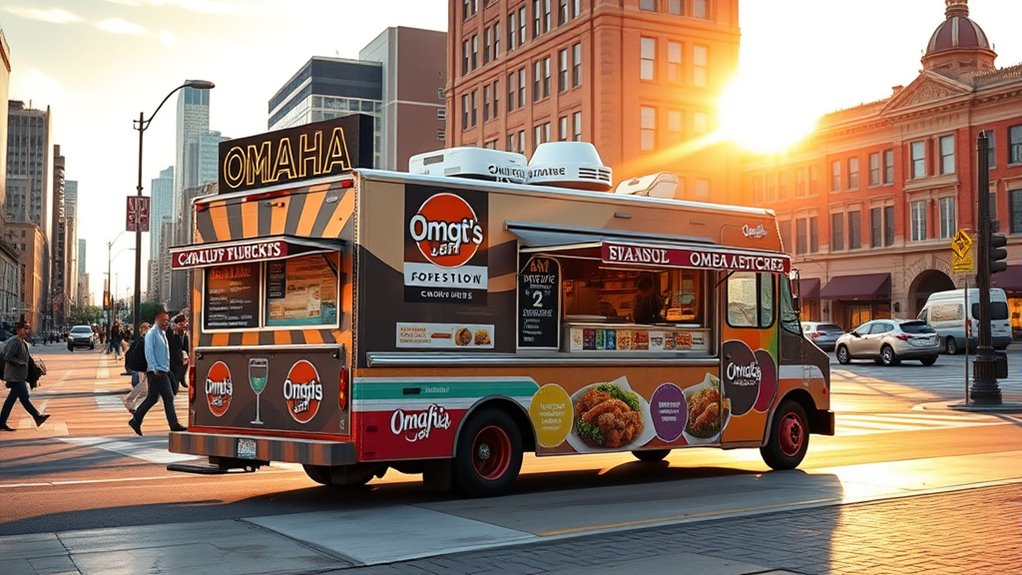
To succeed in Omaha’s competitive food truck scene, choosing the right locations is essential. Focus on high-foot-traffic areas like the Old Market District, where restaurants, shops, and nightlife draw diverse crowds. The Blackstone District appeals to younger, creative customers with arts and events, while Downtown Omaha attracts office workers and tourists during weekday lunch hours. Midtown Crossing and Aksarben Village offer a mix of residential, retail, and family-friendly entertainment. Strategic spots include Harrison Street Corridor and 11th Worth Street, which host active food trucks during peak hours. City-permitted zones, parking lot partnerships, and locations near office parks help maximize visibility. Understanding these areas guarantees you target the right customer bases and boost your chances of success.
Crafting a Menu That Appeals to Local Customers
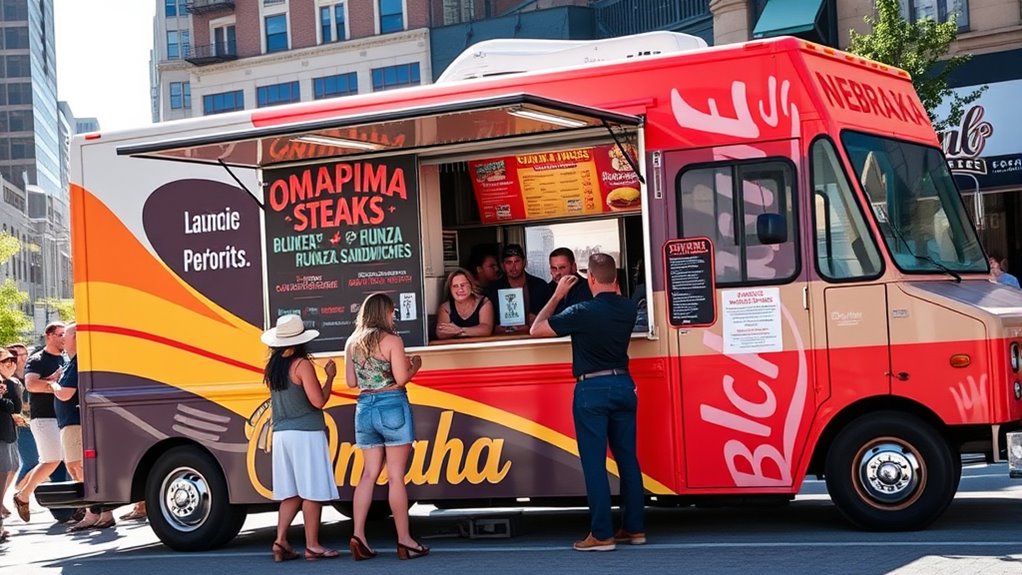
To attract local customers, you need to craft a menu that highlights Omaha’s favorite flavors like barbecue and smoked meats while offering some innovative options. Prioritizing food safety and maintaining quality guarantees customers coming back, especially during busy times. Adding variety and flexibility ensures your menu appeals to different tastes and dietary needs, making your truck a go-to in the community. Incorporating popular local ingredients and dishes can also help you stand out in Omaha’s diverse food scene which has a growing number of food trucks and culinary options. Understanding the importance of healthy self-esteem and positive community relationships can also enhance your outreach efforts and customer loyalty.
Embrace Local Flavors
Certainly! Here’s the revised MY ARTICLE SUBHEADING CONTENT following your instructions:
—
Embracing local flavors in your food truck menu means tapping into Omaha’s rich culinary heritage and diverse tastes. Highlight regional favorites like Omaha’s iconic Reuben sandwiches and Runzas to attract locals and tourists seeking authentic flavors. Incorporate Nebraska’s high-quality beef, emphasizing grilled specialties and signature cuts, appealing to the city’s beef-centric culture. Explore ethnic cuisines gaining popularity, such as Thai, Vietnamese, Chinese, Afghan, and Mexican dishes, blending these influences with Midwestern staples through fusion creations. Seasonal menus featuring fresh, local produce and specialty meats can keep your offerings exciting year-round. Including gluten-free and healthy options caters to diverse dietary preferences. By showcasing Omaha’s culinary diversity and iconic ingredients, you’ll create a menu that resonates deeply with local customers. [Omaha’s diverse culinary scene offers a wealth of inspiration for innovative and appealing menu options.
Prioritize Food Safety
Prioritizing food safety is essential when crafting a menu that appeals to Omaha’s local customers. You need to guarantee all staff complete approved food safety training and stay certified every 2-3 years, demonstrating your commitment to safe food handling. Use only commercial-grade, NSF-certified equipment, and keep your food at safe temperatures with calibrated devices to prevent bacterial growth. Design your truck with nonabsorbent, easy-to-clean materials, and maintain physical separation between the driver and food prep areas to prevent cross-contamination. Provide dedicated handwashing stations with hot water, soap, and disposable towels, and regularly sanitize all surfaces and utensils. When developing your menu, choose items requiring minimal handling, and focus on ingredients that can be stored and prepared safely, reducing risks and building trust with your customers. Proper storage procedures are also critical to prevent spoilage and contamination, ensuring your food remains safe from preparation to serving. Incorporating food safety practices into your daily routine helps maintain high standards and reassures customers of your commitment to quality.
Offer Variety & Flexibility
Offering a diverse and flexible menu is key to appealing to Omaha’s varied customer base. You should include a mix of regional favorites like gyros and tacos, along with international cuisines such as Thai, Vietnamese, and Afghan dishes. Incorporating trending global flavors helps attract adventurous diners and broadens your reach. Provide customizable protein options—like chicken, carne asada, or birria—so customers can tailor meals to their tastes. Including vegetarian and vegan choices appeals to the growing plant-based crowd. Rotating seasonal items and limited-time specials inspired by local events keep your menu fresh and encourage repeat visits. Balancing signature dishes with new offerings and collaborating with local producers can differentiate your truck and deepen your connection with Omaha’s community. Research local food trends to better understand which flavors and dishes resonate most with regional customers, especially considering the increasing popularity of vegan options among diverse demographics.
Effective Marketing Strategies to Grow Your Food Truck Business
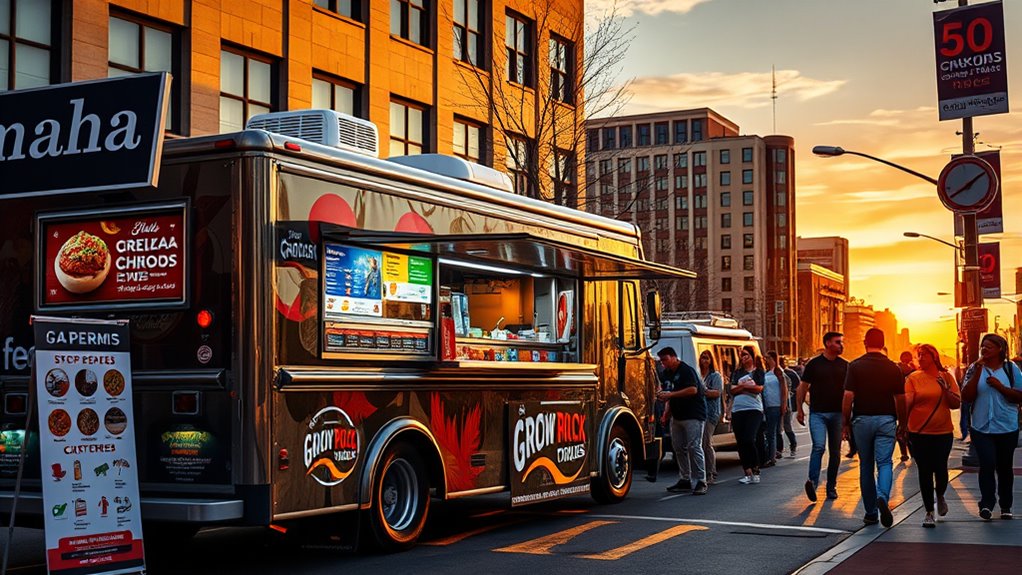
To grow your food truck business, implementing effective marketing strategies is essential. Social media is a powerful tool: 68% of owners use it regularly, with Facebook being the top platform for engaging customers. A strong online presence can boost sales by 20% and encourage customers to spend about 15% more at your truck. Here’s how to maximize your efforts:
- Engage daily on social media to build anticipation and loyalty.
- Participate in local events and festivals to increase visibility and attract new customers. Incorporating personal strengths such as creativity and adaptability into your marketing approach can further enhance your outreach efforts.
- Use loyalty programs and direct communication like email and SMS to retain customers and foster repeat business. Over 50% of food trucks have implemented loyalty programs, resulting in a 30% increase in repeat visits.
Combining these strategies will create a compelling brand presence and grow your Omaha food truck.
Ensuring Compliance and Managing Daily Operations
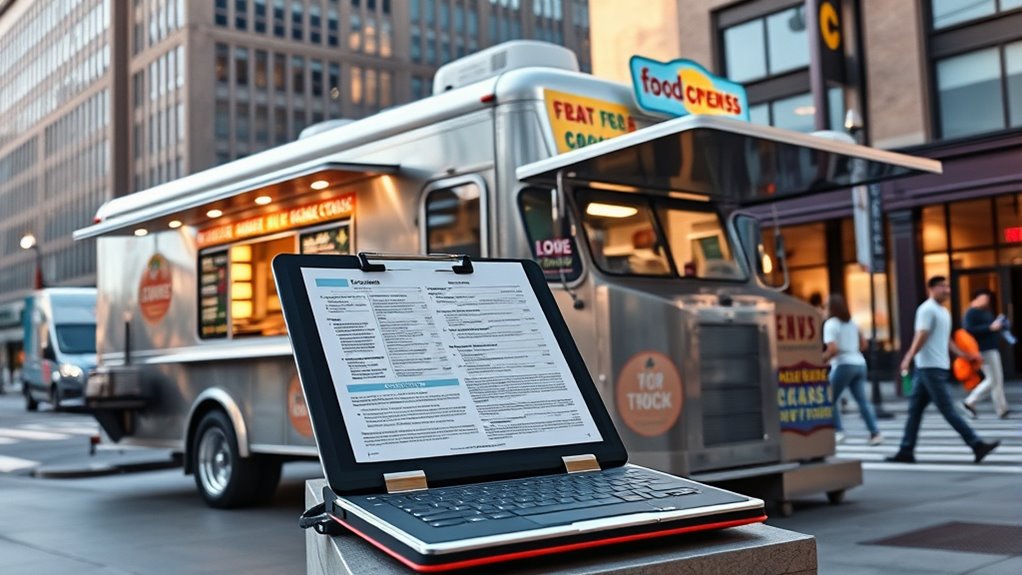
Ensuring compliance and managing daily operations are crucial for the smooth running of your food truck business in Omaha. You must complete food handler certifications for all staff, renewing every 2-3 years, and use approved commissaries or commercial kitchens unless your truck is self-contained. Your equipment should be NSF-certified, calibrated regularly, and your handwashing stations must have hot water, soap, and paper towels. Fire safety requires approved extinguishers and proper ventilation, following Omaha Fire Department rules. You need a valid state permit, displayed visibly, with annual renewals. Daily, manage waste properly and obtain written approval for using electricity in public. Maintain the truck’s construction quality, prevent pest entry, and follow Nebraska Food Code for sanitation. Regular inspections and safety plans are essential to ensure ongoing compliance. Up-to-date health codes and regulations are also vital for maintaining legal operation and avoiding penalties. Incorporating regular equipment maintenance ensures consistent performance and safety standards.
Frequently Asked Questions
How Long Does the Permit Approval Process Typically Take in Omaha?
You’re probably wondering how long the permit approval process takes in Omaha. Typically, vendor permits take about 2-4 weeks, while food truck permits usually need 4-6 weeks due to extra health reviews. The timeline can stretch during busy seasons, but staying proactive—submitting complete paperwork and responding quickly—helps speed things up. Regular follow-up and using online systems also make the process smoother and faster.
Are There Specific Food Safety Certifications Required for Staff in Omaha?
You need to know that Omaha requires all food truck staff to complete an approved food safety training program and obtain certification. As a manager or owner, you must hold a Certified Food Manager (CFM) credential through recognized exams like Learn2Serve or FMC®. All staff members should also be certified food handlers, typically after a 2-hour course, to guarantee everyone understands proper food safety practices and maintains compliance with local health regulations.
Can I Operate My Food Truck at Private Events Without Additional Permits?
Think of your food truck as a ship sailing through Omaha’s permit ocean. For private events on private property, you mainly need your valid mobile food vendor license—no extra city permits required. Just make sure to check with the property owner and keep your health department permits handy. Clear communication and proper documentation are your anchors, ensuring smooth sailing so you can focus on serving delicious meals without legal storms.
What Are the Best Times of Day to Maximize Sales in Omaha’S Busy Areas?
You should focus on peak meal times to maximize sales in Omaha’s busy areas. Target lunch hours from 11:00 AM to 2:00 PM and dinner from 5:00 PM to 8:00 PM, when foot traffic is highest. Additionally, consider late-afternoon hours between 2:00 PM and 5:00 PM to catch customers shifting between activities. Align your schedule with local location patterns and weather conditions for the best results.
Are There Restrictions on Alcohol Sales or Serving Alcohol From Food Trucks?
Imagine you want to serve drinks from your food truck at a local festival. In Omaha, you need a special liquor license from the City Clerk, and selling alcohol without it is illegal. You can’t serve or sell alcohol outside your truck unless specifically permitted. Plus, you must follow zoning laws and safety regulations. Failing to do so can lead to fines or losing your license, so always guarantee proper permits.
Conclusion
Starting your food truck in Omaha is a journey filled with surprises—permits, costs, prime spots, and tasty menus all come together. As you navigate licenses and find the perfect locations, you might find that your best customers walk right by or that a popular event becomes your new favorite spot. With a solid marketing plan and daily management, your success feels almost inevitable. In Omaha, your food truck dream can become a delicious reality—just like that.
